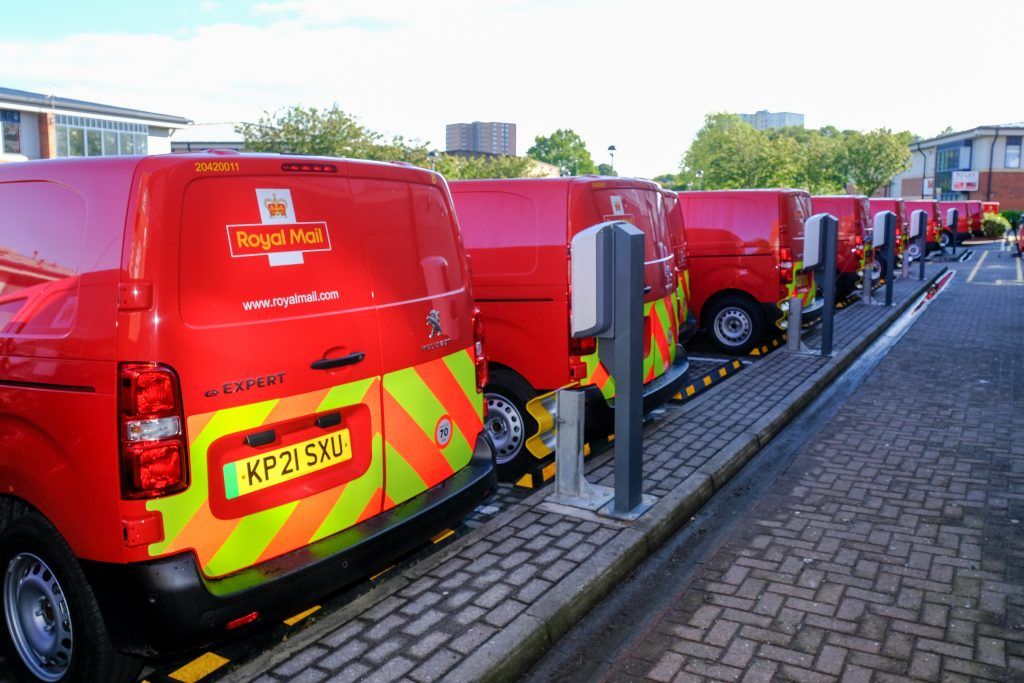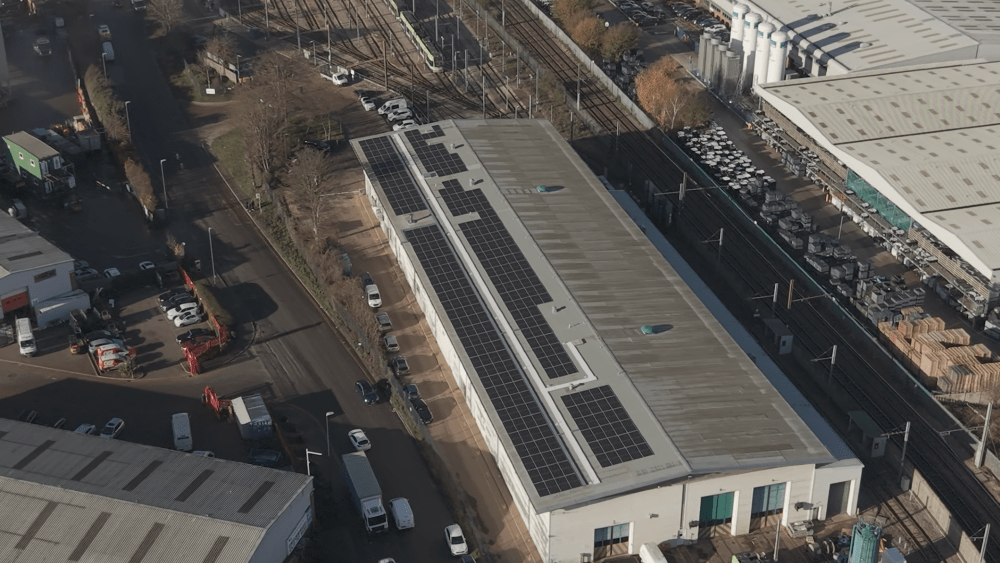Seven major British companies, – BP, BT, Direct Line Group, Royal Mail, ScottishPower, Severn Trent and Tesco – have joined forces to create the Electric Vehicle Fleet Accelerator (EVFA) and will work together to help accelerate the mass adoption of electric vehicles (EVs) across the UK.
The companies operate some of the largest commercial vehicle fleets in the country and in a report published today (29 July) they have outlined the actions needed from both industry and Government to help meet the UK’s ambitions for the electrification of road transport.
The EVFA grew from Prime Minister Boris Johnson’s Build Back Better Business Council. It brings together CEOs of companies that own and operate some of the largest van fleets in the UK and companies involved with infrastructure, EV charging, retail and insurance and repair.
The report details how supportive Government policy could help unlock private sector investment of £50 billion in infrastructure and in electric fleets in the UK over the next five years.
If the Government delivers on this agenda, the EVFA members have committed to converting the fleets involved to electric vehicles by 2030 and to buying British – buying 70,000 British-built vans by 2030 or sooner.
They hope this clear statement of intent will act as a stimulus and help spur the investment decisions needed to develop EV van manufacturing in the UK.
The EVFA members believe this electrification of fleet vehicles can have much wider benefits beyond their businesses, catalysing the mass adoption of EVs in the UK.
The upgrading of the grid and expanding national charging networks that will result will build wider confidence in using EVs. And, as fleets and businesses account for 60% of new vehicle registrations, their electrification will also build and drive an active second-hand market – the main vehicle market for most consumers.
If the infrastructure and frameworks are put in place to enable this, the companies believe wider customer demand can shift towards EVs sooner than is currently expected.
The EVFA’s full 35-page report can be seen here
It sets out detailed recommendations for action, immediately and over this next decade and by both industry and Government. It is focused in four key areas:
- Future-proofing the electricity network infrastructure: ensuring that price controls and funding measures reflect the scale of the challenge, the need to invest in the network ahead of need, and support levelling up with investment in areas the market doesn’t reach.
- Enabling the UK-wide rollout of charging infrastructure: fast-tracking EV charging infrastructure in the planning system, aligning with local authorities to unlock land for charging infrastructure, and setting clear funding frameworks.
- Overcoming demand obstacles: increasing capital support for grid reinforcement costs, introducing minimum standards for reliability, safety and interoperability, and improving access to public charging networks.
- Expanding the supply of UK-made vehicles: providing strong demand signals to OEMs from fleets, setting increasing requirements for zero-emissions vehicles for manufacturers, and incentivising second hand EV market with VAT exemption.
Prime Minister Boris Johnson said: “I wholeheartedly welcome this commitment by leading employers to fully electrify their van fleets by 2030. This announcement will be a major boost to British vehicle production. The government is committed to providing the electric charging points and other infrastructure the UK needs as we build back greener.”
Jonathan Brearley, Ofgem CEO, said: “We welcome this report. The rapid take up of electric vehicles will be vital if Britain is to hit its climate change targets. We are already accelerating investment in the energy networks that support a step change in charge points. We are reducing costs for installing new charging stations and building a market that will make sure that cars can charge at the cheapest possible time.
“We look forward to ongoing work with government, businesses – including members of the EV Fleet Accelerator – and the energy networks to ensure we have the energy system we need to support the electric vehicle revolution.”
Bernard Looney, chief executive of bp, said: “Government and businesses working together can act as a catalyst to accelerate the adoption of electric vehicles throughout the UK. This report from the EVFA highlights the points where Government policy can unlock private sector investment to deliver the necessary charging infrastructure, overcome fleet demand obstacles and create vehicle manufacturing capacity.
“bp is committed to playing our part. We are growing our bp pulse charging network across the UK, aiming to double its size by 2030. Working closely with Government and partners, we can support and enable the transformation of transport in the UK.”
Philip Jansen, Chief Executive of BT Group, commented: “We have a real opportunity to create a low carbon society as we build back from the pandemic. BT Group is leading the way with Openreach as we transition our entire fleet (the UK’s second largest) to electric or zero emissions by 2030.
“At BT, we want to buy British but to do that we need to be confident that the supply of vehicles, components and charging points to keep our vans on the road will be sufficient. This needs to be a team effort with Government removing obstacles and helping take this to the next level.”
Penny James, CEO of Direct Line Group, said: “This is a coherent plan to deliver fleet adoption, addressing the key national infrastructure and supply constraints and acting as the catalyst for the successful mass adoption of EVs. As one of the country’s leading motor insurers we own one of the largest auto repair networks in the UK and we’ve already upskilled 20% of our technicians to repair electric vehicles. This plan promises to give our SME and individual motorists alike the ability to go electric sooner and with confidence.”
Simon Thompson, CEO of Royal Mail, commented: “We are proud to be part of this initiative to accelerate the electrification of van fleets across the UK. With our ‘feet on the street’ network we already have the lowest reported CO2e emissions per parcel of any major UK delivery company, but we want to go further through our investment in electric vehicles. With the right policy and infrastructure in place, Government and industry can turbo-charge the faster rollout of electric vehicles built in the UK.”
Keith Anderson, CEO of ScottishPower, said: “It’s great to see some of the UK’s biggest companies making the switch to EVs early but we have to remember the power network is vital to enabling this transition.
“The electrification of all EVs across the UK will mean a doubling of demand through our grid network and it won’t be ready without urgent action and investment in the grid system – and this investment must happen now and must come ahead of increasing demand.
“We’ve outlined a planned £3.2bn of investment so our network has the capacity needed to reach Net Zero. Getting this right will support thousands of green jobs and help unlock billions of private sector investment.”
Liv Garfield, Severn Trent Chief Executive, said: “We set ourselves the challenge of reaching net zero carbon emissions, using 100% renewable energy and having a fleet of vehicles that are entirely electric by 2030. This triple carbon pledge is our response to climate change and the threat it poses to the environment and the communities we serve.
“We’re well on our way to meeting these ambitious targets, including our electric vehicle pledge. We’re installing hundreds of EV charging points across our sites and we’ve already welcomed the first electric vehicles into our fleet, with more expected to arrive in the near future. We’ve achieved all of this, despite what the last year has thrown at us. In fact, the pandemic has made us more determined than ever, as we help the country to build back greener and cleaner.”
Ken Murphy, Tesco CEO, stated: “As part of Tesco’s commitment to net zero, we will fully electrify our fleet by 2028. Businesses can support the UK’s transition to zero emissions transport by switching to electric company fleets and helping customers do the same.
“If implemented, the recommendations in this report will deliver game-changing EV infrastructure for businesses and the public. We look forward to working with Government alongside the members of the EVFA to achieve this ambition.”
Image courtesy of Royal Mail.












